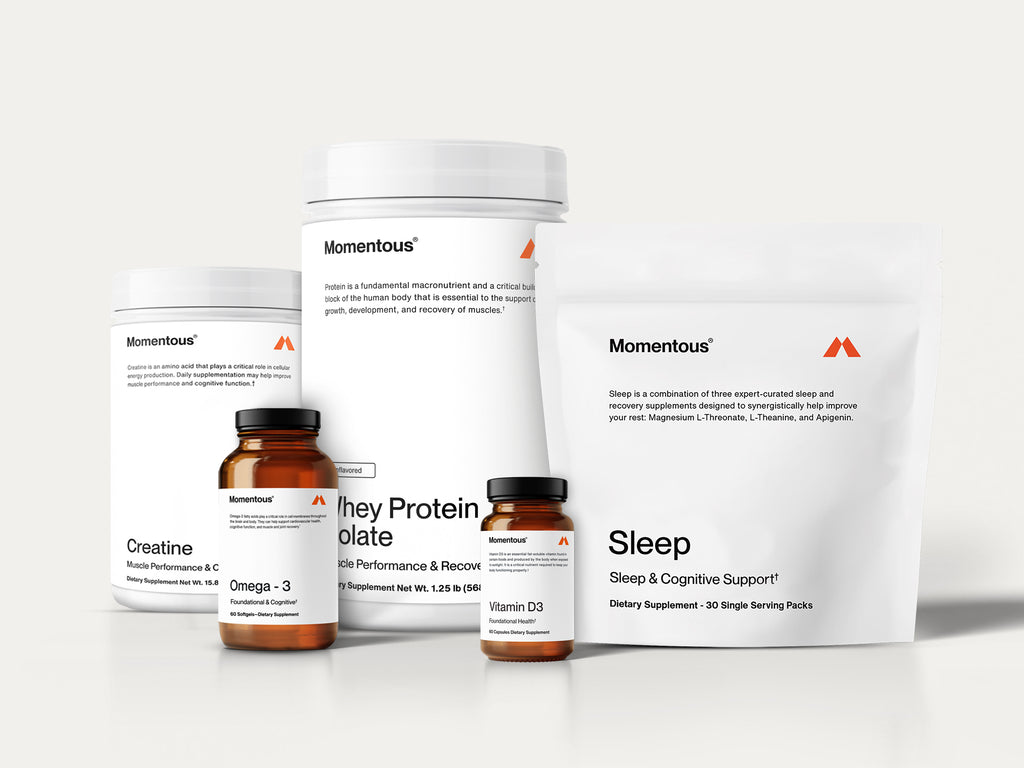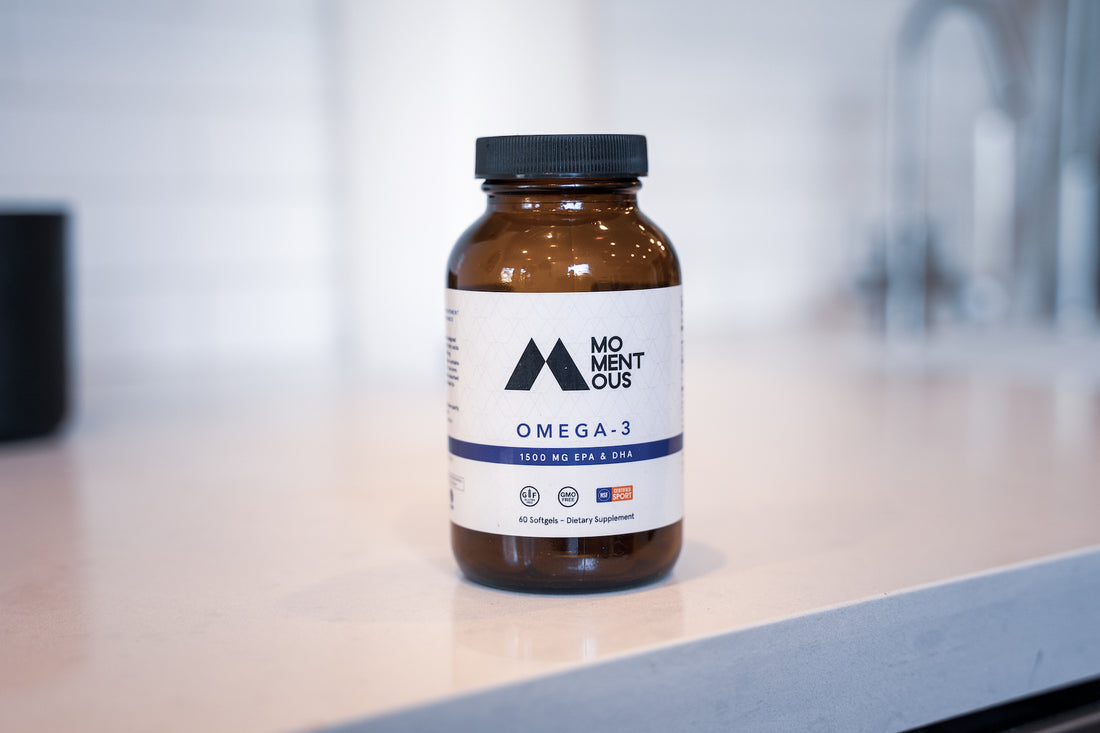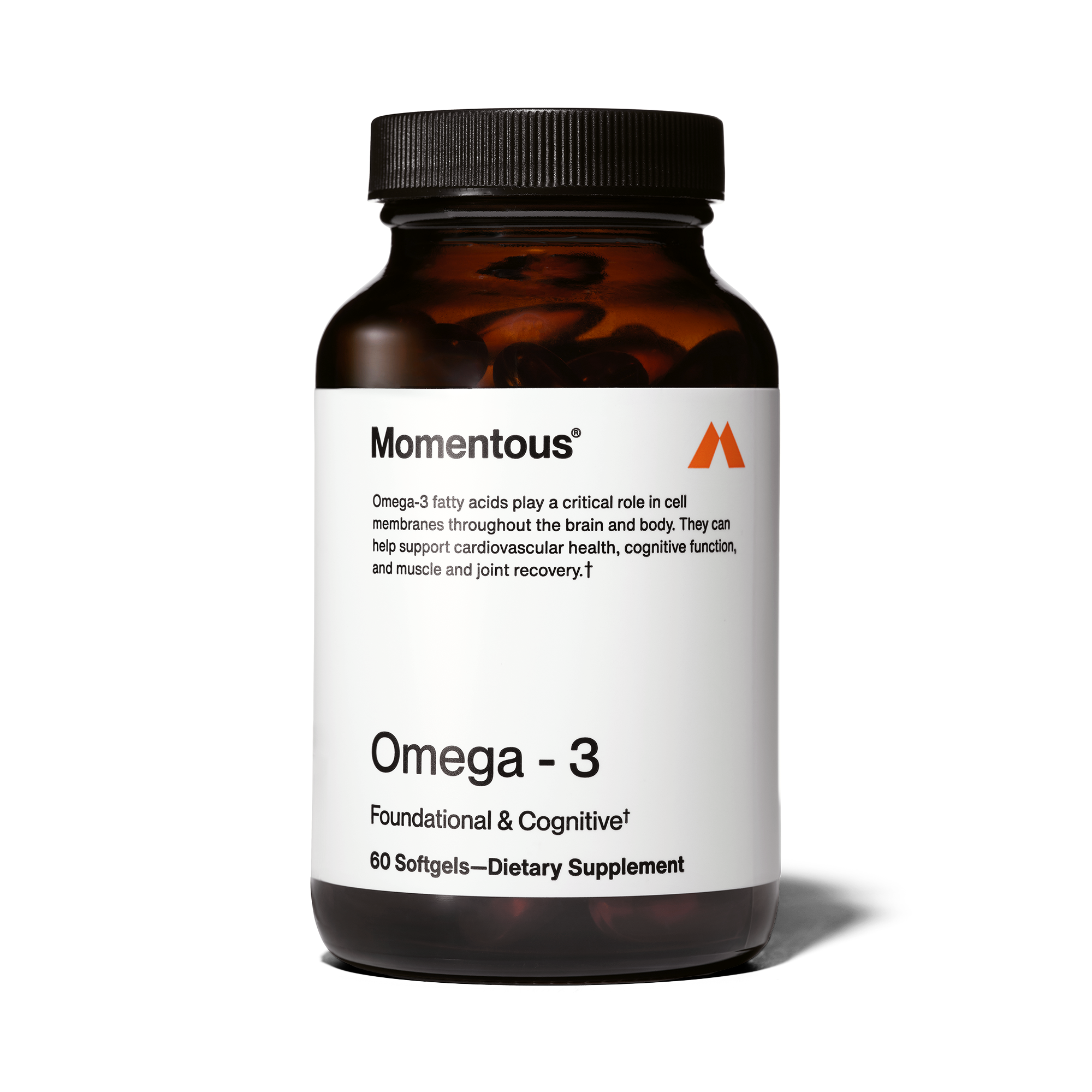Cognitive Function, Foundational Health
Whether you’re shopping at a grocery store, a pharmacy, or your go-to online retailer, you can find fish oil just about anywhere. But because omega-3 supplements are so pervasive, there are a lot of options that vary greatly in purity, quality, and efficacy. In this post, we’ll examine what sets the three main ingredients in Momentous Omega-3 apart.
Boosting Cardiovascular Health and Combating Chronic Inflammation with EPA
Eicosapentaenoic acid (EPA) is one of the two types of omega-3 fatty acids found in fish oil (we’ll focus on the other, DHA, in a moment). Research conducted at Tufts University found that both EPA and DHA are effective in tackling long-term inflammation that can make you more susceptible to a whole host of diseases and chronic conditions.[1] While DHA lowered secretion of three types of pro-inflammatory proteins and lowered the genetic expression of four others, study co-author Jisun So told ScienceDaily: “In our bodies, there is always this balance between pro-inflammatory and anti-inflammatory proteins, and we found EPA was better than DHA at enhancing that balance. For the prevention of cardiovascular disease, previous research tells us that balance is very important.”[2]
Fish-derived omega-3 supplements offer cardio-protective properties that exceed their ability to merely reduce inflammation. In a review for Circulatory Reports, scientists from Juntendo University in Tokyo wrote that EPA and DHA “have anti-atherogenic effects (e.g., neutral fat-lowering effects) and other beneficial effects such as antiplatelet, anti-inflammatory, plaque stabilizing, vascular endothelial function ameliorative, antihypertensive, and anti-arrhythmic effects.”[3]
Omega-3s don’t just help reduce the incidence of cardiovascular disease if you’re relatively healthy, but they might also lower your chance of an existing issue recurring if you’re already grappling with a cardiovascular condition. When combined with a statin, EPA supplementation helped participants who’d had a coronary event reduce their risk of suffering another by 19 percent according to a five-year Japanese study, a 9 percent improvement over the group that only took the statin.[4] Other research has shown that omega-3 supplementation also lowers the risk of hypertension (high blood pressure), reduces blood levels of LDL cholesterol, and limits plaque buildup in arteries.
Protecting Your Brain and Improving Memory and Mood with DHA
Docosahexaenoic acid (DHA) is the second kind of omega-3 found in fish oil. It has some crossover benefits with its close cousin, EPA, but also offers several unique advantages. Like EPA, it is an essential fatty acid, so your body cannot synthesize it. This means that you need to source it from food and supplementation.
There’s a growing body of knowledge to suggest that omega-3s are influential in the growth and preservation of brain matter. A paper published in The FASEB Journal found that DHA and EPA tag team production of the neurotransmitter serotonin, which is involved in regulating emotions, sleep, digestion, and many other crucial functions.[5] DHA makes a certain kind of receptor more susceptible to serotonin, while EPA increases its release from presynaptic neurons. Such an increase in serotonin levels might help people with autism, mood disorders, and depression.
If you are pregnant, your doctor has probably recommended taking a multivitamin, but you might also want to incorporate an omega-3 supplement. A study released via Advances in Nutrition stated that, “EPA and DHA are important for proper fetal development, including neuronal, retinal, and immune function.”[6] At the other end of the age scale, omega-3 fatty acids show promise in preserving mental function as you age.
A review by the Lipid Research Clinics noted that patients suffering from Alzheimer’s have low levels of omega-3 fatty acids in their blood and suggested that, “DHA supplementation has been shown to protect against amyloid-β production, accumulation and toxicity” that is linked to the development and progression of this condition.[7] The authors also found that regularly taking DHA and EPA improves learning, spatial recognition, and other mental capabilities in people struggling with age-related cognitive decline. Another study found that recall improved when participants regularly consumed an omega-3 supplement.[8]
It’s not just older people who can benefit from increasing their omega-3 consumption. A study published in PLOS ONE found that when young adults aged between 18 and 25 supplemented with DHA as part of a one gram per day combined dose with EPA, their episodic memory was better.[9] Study subjects also improved their semantic and working memory when they consistently took a similar daily dose. Commenting on the findings, co-author and University of Pittsburgh neuroscience professor Bita Moghaddam said: “Before seeing this data, I would have said it was impossible to move young healthy individuals above their cognitive best. We found that members of this population can enhance their working memory performance even further, despite their already being at the top of their cognitive game.”[10]
Improving Digestion with Lipase
If you’ve had a bad experience with fish oil in the past, it’s likely because it was in the ethyl ester form that is harder to digest. This can manifest itself in stomach discomfort and odorous fish burps. Adding a pancreatic enzyme like lipase eliminates such issues and can improve the digestibility of an omega-3 supplement by 12 to 15 percent. Such benefits are amplified when the DHA and EPA fatty acids are in the natural triglyceride form, which is more readily absorbed by your gut. In contrast, a study published in the Journal of Lipid Research found that “ethyl esters were hydrolyzed 10-50 times more slowly” than triglycerides.[11]
Momentous Omega 3 combines lipase with DHA and EPA in the highly bioavailable triglyceride form that’s more readily utilized by your body than the common, lower-quality ethyl ester kind. A serving of two capsules provides a total of 1,500 mg of omega-3s with a 1:1 ratio of EPA to DHA. So whether you’re looking to safeguard your heart health, boost cognition, improve memory, or just enhance your overall wellbeing, give this unique formula a try.
Resources:
[1] Jisun So et al, “EPA and DHA Differentially Modulate Monocyte Inflammatory Response in Subjects with Chronic Inflammation in Part via Plasma Specialized Pro-Resolving Lipid Mediators: A Randomized, Double-Blind, Crossover Study,” Atherosclerosis, December 7, 2020, available online at https://linkinghub.elsevier.com/retrieve/pii/S0021915020315276.
[2] “Fish Oil Omega-3s EPA and DHA Work Differently on Chronic Inflammation,” ScienceDaily, December 7, 2020, available online at https://www.sciencedaily.com/releases/2020/12/201207091313.htm.
[3] Yuji Nishizaki and Hiroyuki Daida, “Optimal Dose of n-3 Polyunsaturated Fatty Acids for Cardiovascular Event Prevention,” Ciculatory Reports, March 28, 2020, available online at https://pubmed.ncbi.nlm.nih.gov/33693239/.
[4] Mitsuhiro Yokoyama et al, “Effects of Eicosapentaenoic Acid on Major Coronary Events in Hypercholesterolaemic Patients (JELIS): A Randomised Open-Label, Blinded Endpoint Analysis,” Lancet, March 31, 2007, available online at https://pubmed.ncbi.nlm.nih.gov/17398308/.
[5] Rhonda P. Patrick and Bruce N. Ames, “Vitamin D and the Omega-3 Fatty Acids Control Serotonin Synthesis and Action, Part 2: Relevance for ADHD, Bipolar Disorder, Schizophrenia, and Impulsive Behavior,” The FASEB Journal, February 24, 2015, available online at https://faseb.onlinelibrary.wiley.com/doi/10.1096/fj.14-268342.
[6] Danielle Swanson, Robert Block, and Shaker A Mousa, “Omega-3 Fatty Acids EPA and DHA: Health Benefits Throughout Life,” Advances in Nutrition, January 2012, available online at https://www.ncbi.nlm.nih.gov/pmc/articles/PMC3262608/.
[7] Jennifer G Robinson, Nkechinyere Ijioma, and William Harris, “Omega-3 Fatty Acids and Cognitive Function in Women,” Women’s Health, November 1, 2010, available online at https://www.ncbi.nlm.nih.gov/pmc/articles/PMC2826215/.
[8] Karin Yurko-Mauro, Dominik D Alexander, and Mary E Van Elswyk, “Docosahexaenoic Acid and Adult Memory: A Systematic Review and Meta-Analysis,” PLOS ONE, March 18, 2015, available online at https://pubmed.ncbi.nlm.nih.gov/25786262/.
[9] Rajesh Narendran et al, “Improved Working Memory but No Effect on Striatal Vesicular Monoamine Transporter Type 2 after Omega-3 Polyunsaturated Fatty Acid Supplementation,” PLOS ONE, October 3, 2012, available online at https://journals.plos.org/plosone/article?id=10.1371/journal.pone.0046832.
[10] “Omega-3 Intake Heightens Working Memory in Healthy Young Adults,” ScienceDaily, October 25, 2012, available online at https://www.sciencedaily.com/releases/2012/10/121025122433.htm.
[11] L Y Yang, A Kuksis, and J J Myher, “Lipolysis of Menhaden Oil Triacylglycerols and the Corresponding Fatty Acid Alkyl Esters by Pancreatic Lipase in Vitro: a Reexamination,” Journal of Lipid Research, January 1990, available online at https://pubmed.ncbi.nlm.nih.gov/2313198/.









